人教版(2019)选择性必修 第三册Unit 4 Adversity and Courage Discovering useful structures 课件(共34张PPT)
文档属性
| 名称 | 人教版(2019)选择性必修 第三册Unit 4 Adversity and Courage Discovering useful structures 课件(共34张PPT) |  | |
| 格式 | pptx | ||
| 文件大小 | 4.4MB | ||
| 资源类型 | 教案 | ||
| 版本资源 | 人教版(2019) | ||
| 科目 | 英语 | ||
| 更新时间 | 2024-02-12 22:16:50 | ||
图片预览

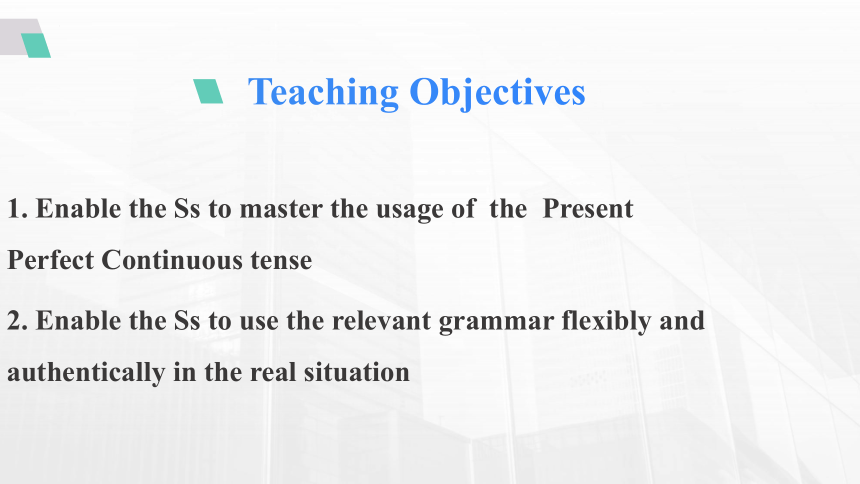

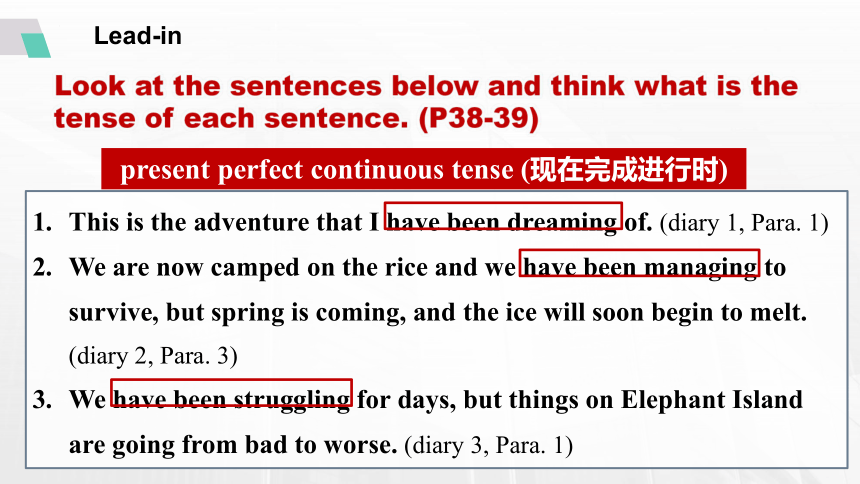
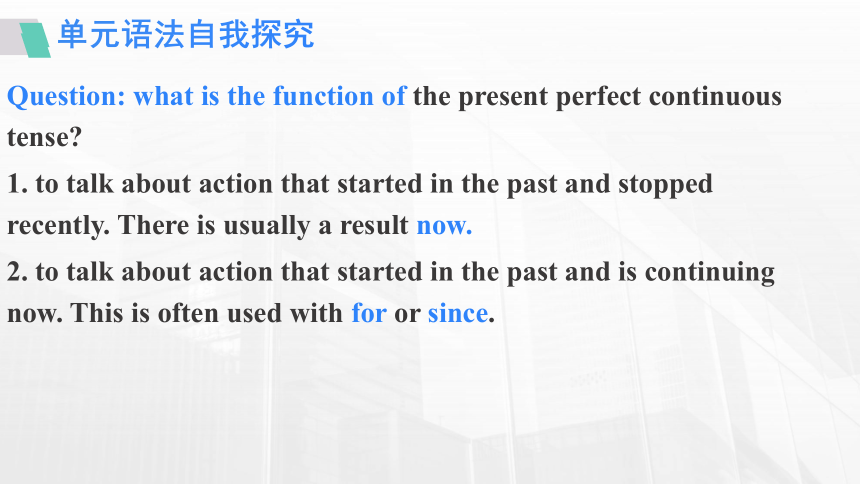
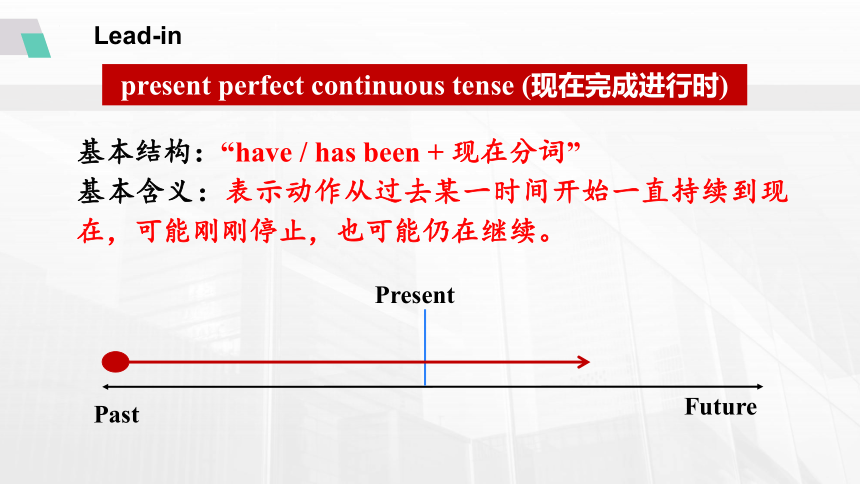

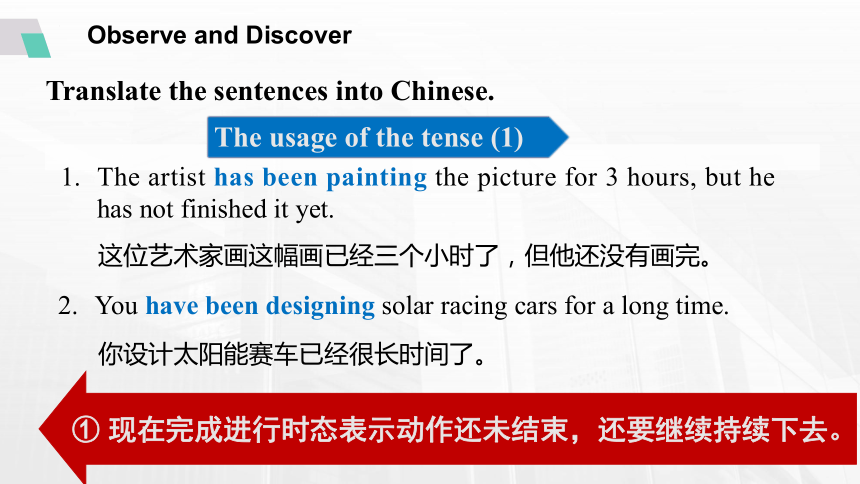
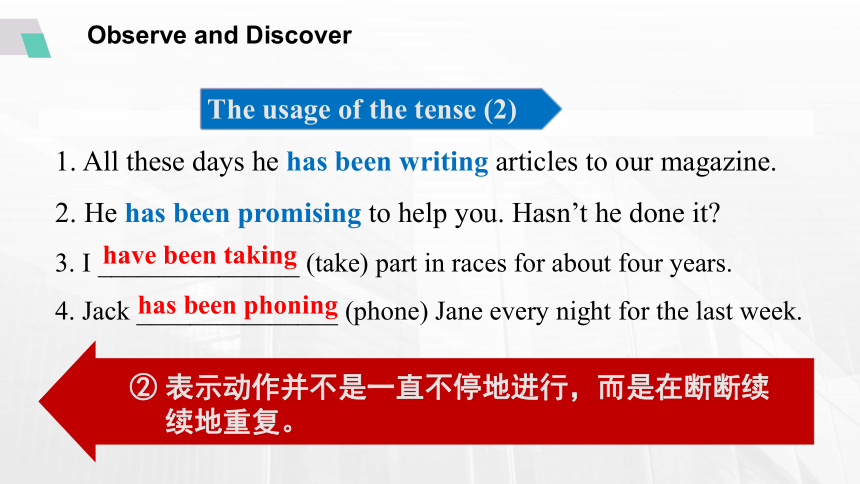
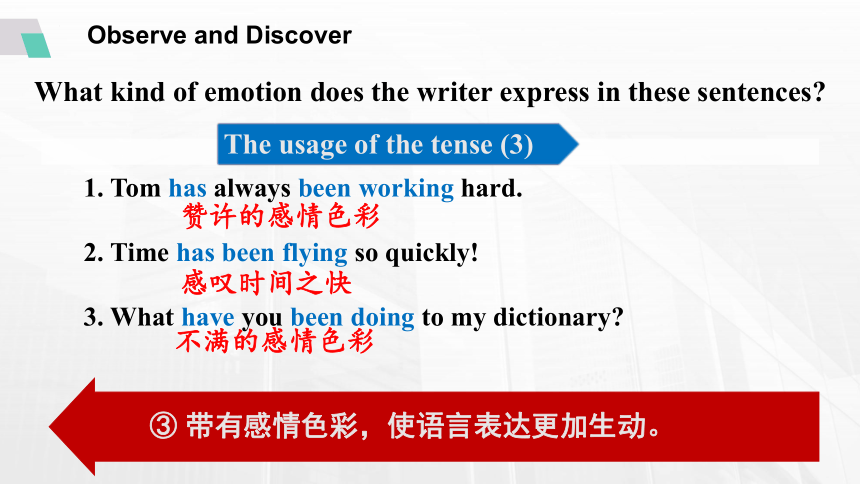
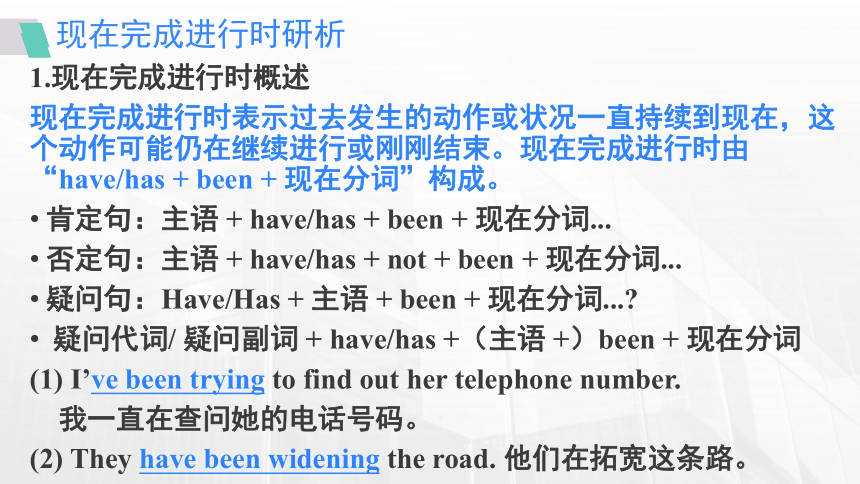
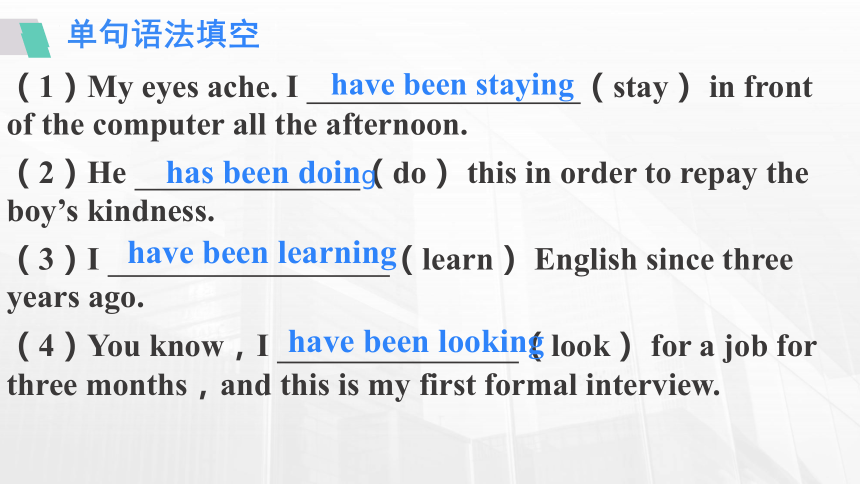
文档简介
(共34张PPT)
【版本:新人教 册别:选择性必修三】
Discovering Useful Structures
UNIT 4 ADVERSITY AND COURAGE
1. Enable the Ss to master the usage of the Present Perfect Continuous tense
2. Enable the Ss to use the relevant grammar flexibly and authentically in the real situation
Teaching Objectives
Ⅰ
Lead-in
Lead-in
This is the adventure that I have been dreaming of. (diary 1, Para. 1)
We are now camped on the rice and we have been managing to survive, but spring is coming, and the ice will soon begin to melt. (diary 2, Para. 3)
We have been struggling for days, but things on Elephant Island are going from bad to worse. (diary 3, Para. 1)
Look at the sentences below and think what is the tense of each sentence. (P38-39)
present perfect continuous tense (现在完成进行时)
Question: what is the function of the present perfect continuous tense
1. to talk about action that started in the past and stopped recently. There is usually a result now.
2. to talk about action that started in the past and is continuing now. This is often used with for or since.
单元语法自我探究
Lead-in
基本结构:“have / has been + 现在分词”
基本含义:表示动作从过去某一时间开始一直持续到现在,可能刚刚停止,也可能仍在继续。
Present
Past
Future
present perfect continuous tense (现在完成进行时)
Ⅱ
Observe and Discover
Observe and Discover
The usage of the tense (1)
The artist has been painting the picture for 3 hours, but he has not finished it yet.
You have been designing solar racing cars for a long time.
这位艺术家画这幅画已经三个小时了,但他还没有画完。
你设计太阳能赛车已经很长时间了。
现在完成进行时态表示动作还未结束,还要继续持续下去。
Translate the sentences into Chinese.
Observe and Discover
The usage of the tense (2)
1. All these days he has been writing articles to our magazine.
2. He has been promising to help you. Hasn’t he done it
3. I _______________ (take) part in races for about four years.
4. Jack _______________ (phone) Jane every night for the last week.
have been taking
has been phoning
表示动作并不是一直不停地进行,而是在断断续续地重复。
Observe and Discover
1. Tom has always been working hard.
2. Time has been flying so quickly!
3. What have you been doing to my dictionary
带有感彩,使语言表达更加生动。
赞许的感彩
感叹时间之快
不满的感彩
What kind of emotion does the writer express in these sentences
The usage of the tense (3)
1.现在完成进行时概述
现在完成进行时表示过去发生的动作或状况一直持续到现在,这个动作可能仍在继续进行或刚刚结束。现在完成进行时由“have/has + been + 现在分词”构成。
肯定句:主语 + have/has + been + 现在分词...
否定句:主语 + have/has + not + been + 现在分词...
疑问句:Have/Has + 主语 + been + 现在分词...
疑问代词/ 疑问副词 + have/has +(主语 +)been + 现在分词
(1) I’ve been trying to find out her telephone number.
我一直在查问她的电话号码。
(2) They have been widening the road. 他们在拓宽这条路。
现在完成进行时研析
(1)My eyes ache. I (stay) in front of the computer all the afternoon.
(2)He (do) this in order to repay the boy’s kindness.
(3)I (learn) English since three years ago.
(4)You know,I (look) for a job for three months,and this is my first formal interview.
have been staying
has been doing
have been learning
have been looking
单句语法填空
2. 现在完成进行时的用法
1)表示过去发生并持续到现在的动作
How long have you been learning English
你学习英语多久了?
She has been burning the midnight oil to prepare for GRE recently.
她最近在熬夜准备研究生入学资格考试。
Tom has been playing the online games for more than twenty hours.
汤姆玩网游已经超过二十个小时了。
His brother has been writing this novel since last year.
他哥哥从去年起就一直在写这本小说。
2)表示到目前为止的一段时间内重复进行的活动
I have been telling you not to make trouble.
我一直劝你不要找麻烦。
The old man has been repairing cars for thirty years.
这个老人修汽车修了三十年了。
Jack has been practising Tai Chi for more than a year.
杰克练太极一年多了。
(3)表示根据直接或间接的证据而得出结论
His eyes are red. He has been working too hard recently.
他的眼睛红了,准是他最近工作太辛苦了。
1) —I have got a headache. 我头痛。
— No wonder. You have been working in front of that computer too long.
不足为奇。你在那台电脑前工作太久了。
2) —I’m sure Andrew will win first prize in the final.
我相信安德鲁在决赛中会得第一名。
3) —I think so. He has been preparing for it for months.
我也是这样认为的。他为此准备好几个月了。
4)表达某种感彩:现在完成进行时有时带有强烈的表扬或厌恶等感彩。
We’ve been looking forward to our summer vacation. 我们一直盼望着暑假。
Too much has been happening today. 今天真是一个多事的日子。
以下几类动词不能用于现在完成进行时:
① 表示感官、感觉:see,hear,smell 等;
② 表示爱憎:love,prefer,mind 等;
③ 表示希望、意愿:wish,want,desire 等;
④ 表示相信、猜想:believe,think,suppose 等;
⑤ 非延续性动词。
学法点拨
Which tense is used to emphasise the continuation (持续;连续) of the action
This is the adventure that I have been dreaming of.
This is the adventure that I have dreamt of.
We have been struggling for days.
We have struggled for days.
Which tense is used to talk about a finished action, and which is about an unfinished action
We have been managing to survive.
We have managed to survive.
Which tense is used to emphasise the length of time
Observe and Discover
finished action
unfinished action
3 .现在完成进行时与现在完成时的区别
(1) 现在完成时强调完成和影响,现在完成进行时强调未完成和动作。
I’ve been doing my homework. 我一直在做家庭作业。(还在做)
I’ve finished my homework. 我已做完家庭作业了。(已完成)
(2) 现在完成时经常表单个事件,现在完成进行时可表重复事件。
Julia has gone to the library. 朱莉娅去图书馆了。(单个事件)
Julia has been going to the library for a year. 朱莉娅在一年 间经常去图书馆。(重复事件)
(3) 现在完成时通常只陈述事实,而现在完成进行时含感彩。
What have you done 你做什么了?(仅是问问)
Where have you been I have been waiting for you in the rain for two hours.
你去哪里了?我在雨中等了你两个小时。(表示不满)
(4) 表重复时,现在完成时强调成果,讲次数;现在完成进行时强调持续,不讲次数。
I have sent thirty e-mails this morning.
我今天上午发了三十封电子邮件。
I have been sending e-mails this morning.
我今天上午一直在发电子邮件。
(5) 不用于进行时态的动词通常也不用于现在完成进行时,但它们可以用于现在完成时。
The war has lasted for a long time.
这场战争持续了很长时间。
(6) 现在完成进行时不用于被动语态。若要用,可用现在完成时的被动语态代替。
The house has been painted for a month.
房子已经粉刷了一个月了。
Observe and Discover
现在完成时与现在完成进行时的区别:
summary 现在完成进行时 现在完成时
强调动作的_________ 强调动作的_______
多用来询问和表达一个______________或_________________ 多用来询问和表达一个________________或____________________
延续
完成
正在发生的动作
活动延续多长时间
已结束的动作
活动所完成的分量和频率
Observe and Discover
现在完成进行时陈述句、一般疑问句和简单句的简单回答:
陈述句 一般疑问句 简单回答
I / We / You / They have (not) been working ...
He / She / It has (not) been working ...
Have I / we / you / they been working …
Has he / she / it been working ...
Yes, I / we / you / they have.
No, I / we / you / they haven’t.
Yes, he / she / it has.
No, he / she / it hasn’t.
present perfect continuous tense vs past perfect continuous tense
1. Tom had been texting his pen pal for four years.
2. Tom has been texting his pen pal for four years .
Try to compare the following two sets of sentences.
过去完成进行时表示过去一段时间内一直在做的事情,现在已经终止了;
现在完成进行时表示过去某个时段一直做着一件事,并到现在还在继续。
1. She had been suffering from a bad cold when she took the exam.
2. She has been suffering from a bad cold since she took the exam.
Ⅲ
Practice and Apply
Read each situation and rewrite each sentence using the present perfect continuous tense. (P41 E2)
Read each situation and rewrite each sentence using the present perfect continuous tense. (P41 E2)
Steve started to play rugby (英式橄榄球运动) at the age of eight. Now he has become a professional player.
_____________________________________________________
_____________________________________________________
Timmy is holding a table tennis bat (球拍) and his short hair is damp (微湿的;潮湿的) with sweat. He looks a little tired after playing table tennis for two hours.
______________________________________________________
______________________________________________________
______________________________________________________
Steve has been playing rugby since the age of eight. Now he has become a professional player.
Timmy is holding a table tennis bat and his short hair is damp with sweat. He looks a little tired because he has been playing table tennis for two hours.
Read each situation and rewrite each sentence using the present perfect continuous tense. (P41 E2)
Diane hasn’t got much sleep this week. She looks terrible today.
_______________________________________________
_______________________________________________
I tried to phone you this morning. I must have tried a dozen times before I caught you here.
_________________________________________________
_________________________________________________
Diane hasn’t been sleeping well this week. She looks terrible today.
I have been trying to phone you this morning. I must have tried a dozen times before I caught you here.
Did this action start from the past and last / repeat till now
Is it likely that this action will continue in the future
Is the speaker expressing strong emotion in this sentence
Is the speaker trying to emphasise the action has lasted long
Thinking Time
P41 E2
Complete the sentences below using the correct tenses of the verbs in brackets. Then explain your reasons to your partner. (P41 E3)
For the whole morning, the board of directors _______________ (discuss) the resolution to increase wages in the coming year.
Jason’s only recreation is painting. He ______________ (learn) how to paint for over five years.
Even though we lost the game, we should be proud of ourselves because we ______ (try) our best and _______ (work) as a team.
has been discussing
has been learning
tried
worked
Complete the sentences below using the correct tenses of the verbs in brackets. Then explain your reasons to your partner. (P41 E3)
He finally ________ (finish) the research paper under his tutor’s guidance.
My nephew Sam _________________ (collect) comic books since he was five. Now he has more than two hundred of them.
The company __________________________________ (launch) an advertising campaign to promote its corporate image.
is launching / has launched / launched
finished
has been collecting
Complete the sentences below using the correct tenses of the verbs in brackets. Then explain your reasons to your partner. (P41 E3)
Interview your partner about the things that he / she has been doing. (P41 E4)
Useful questions:
Do you have any hobbies or interests
How long have you been learning / playing ...
What have you been doing recently
Work in pairs
Sample Conversation
A: Do you have any hobbies
B: Sure. I have several hobbies such as table tennis, photography, and
kite flying. But my favourite hobby is playing the guitar.
A: How long have you been learning the guitar
B: I have been learning the guitar since I was eight years old. I saw a
video of someone playing and I fell in love with it.
A: That’s great.
Practice and Apply
Food supplies in the flood-stricken area ____________ (run) out. We must act immediately before there’s none left. Up to now, the program __________ (save) thousands of children who would otherwise have died. It ___________ (report) that many a new house _____________ (rebuild) at present in the disaster area. Police ____________ (search) for a woman now who is reported to ________________ (miss) since the flood ____ (hit) the area last Friday.
语篇填空
hit
are running
has saved
is reported
is being rebuilt
are searching
have been missing
【版本:新人教 册别:选择性必修三】
Discovering Useful Structures
UNIT 4 ADVERSITY AND COURAGE
1. Enable the Ss to master the usage of the Present Perfect Continuous tense
2. Enable the Ss to use the relevant grammar flexibly and authentically in the real situation
Teaching Objectives
Ⅰ
Lead-in
Lead-in
This is the adventure that I have been dreaming of. (diary 1, Para. 1)
We are now camped on the rice and we have been managing to survive, but spring is coming, and the ice will soon begin to melt. (diary 2, Para. 3)
We have been struggling for days, but things on Elephant Island are going from bad to worse. (diary 3, Para. 1)
Look at the sentences below and think what is the tense of each sentence. (P38-39)
present perfect continuous tense (现在完成进行时)
Question: what is the function of the present perfect continuous tense
1. to talk about action that started in the past and stopped recently. There is usually a result now.
2. to talk about action that started in the past and is continuing now. This is often used with for or since.
单元语法自我探究
Lead-in
基本结构:“have / has been + 现在分词”
基本含义:表示动作从过去某一时间开始一直持续到现在,可能刚刚停止,也可能仍在继续。
Present
Past
Future
present perfect continuous tense (现在完成进行时)
Ⅱ
Observe and Discover
Observe and Discover
The usage of the tense (1)
The artist has been painting the picture for 3 hours, but he has not finished it yet.
You have been designing solar racing cars for a long time.
这位艺术家画这幅画已经三个小时了,但他还没有画完。
你设计太阳能赛车已经很长时间了。
现在完成进行时态表示动作还未结束,还要继续持续下去。
Translate the sentences into Chinese.
Observe and Discover
The usage of the tense (2)
1. All these days he has been writing articles to our magazine.
2. He has been promising to help you. Hasn’t he done it
3. I _______________ (take) part in races for about four years.
4. Jack _______________ (phone) Jane every night for the last week.
have been taking
has been phoning
表示动作并不是一直不停地进行,而是在断断续续地重复。
Observe and Discover
1. Tom has always been working hard.
2. Time has been flying so quickly!
3. What have you been doing to my dictionary
带有感彩,使语言表达更加生动。
赞许的感彩
感叹时间之快
不满的感彩
What kind of emotion does the writer express in these sentences
The usage of the tense (3)
1.现在完成进行时概述
现在完成进行时表示过去发生的动作或状况一直持续到现在,这个动作可能仍在继续进行或刚刚结束。现在完成进行时由“have/has + been + 现在分词”构成。
肯定句:主语 + have/has + been + 现在分词...
否定句:主语 + have/has + not + been + 现在分词...
疑问句:Have/Has + 主语 + been + 现在分词...
疑问代词/ 疑问副词 + have/has +(主语 +)been + 现在分词
(1) I’ve been trying to find out her telephone number.
我一直在查问她的电话号码。
(2) They have been widening the road. 他们在拓宽这条路。
现在完成进行时研析
(1)My eyes ache. I (stay) in front of the computer all the afternoon.
(2)He (do) this in order to repay the boy’s kindness.
(3)I (learn) English since three years ago.
(4)You know,I (look) for a job for three months,and this is my first formal interview.
have been staying
has been doing
have been learning
have been looking
单句语法填空
2. 现在完成进行时的用法
1)表示过去发生并持续到现在的动作
How long have you been learning English
你学习英语多久了?
She has been burning the midnight oil to prepare for GRE recently.
她最近在熬夜准备研究生入学资格考试。
Tom has been playing the online games for more than twenty hours.
汤姆玩网游已经超过二十个小时了。
His brother has been writing this novel since last year.
他哥哥从去年起就一直在写这本小说。
2)表示到目前为止的一段时间内重复进行的活动
I have been telling you not to make trouble.
我一直劝你不要找麻烦。
The old man has been repairing cars for thirty years.
这个老人修汽车修了三十年了。
Jack has been practising Tai Chi for more than a year.
杰克练太极一年多了。
(3)表示根据直接或间接的证据而得出结论
His eyes are red. He has been working too hard recently.
他的眼睛红了,准是他最近工作太辛苦了。
1) —I have got a headache. 我头痛。
— No wonder. You have been working in front of that computer too long.
不足为奇。你在那台电脑前工作太久了。
2) —I’m sure Andrew will win first prize in the final.
我相信安德鲁在决赛中会得第一名。
3) —I think so. He has been preparing for it for months.
我也是这样认为的。他为此准备好几个月了。
4)表达某种感彩:现在完成进行时有时带有强烈的表扬或厌恶等感彩。
We’ve been looking forward to our summer vacation. 我们一直盼望着暑假。
Too much has been happening today. 今天真是一个多事的日子。
以下几类动词不能用于现在完成进行时:
① 表示感官、感觉:see,hear,smell 等;
② 表示爱憎:love,prefer,mind 等;
③ 表示希望、意愿:wish,want,desire 等;
④ 表示相信、猜想:believe,think,suppose 等;
⑤ 非延续性动词。
学法点拨
Which tense is used to emphasise the continuation (持续;连续) of the action
This is the adventure that I have been dreaming of.
This is the adventure that I have dreamt of.
We have been struggling for days.
We have struggled for days.
Which tense is used to talk about a finished action, and which is about an unfinished action
We have been managing to survive.
We have managed to survive.
Which tense is used to emphasise the length of time
Observe and Discover
finished action
unfinished action
3 .现在完成进行时与现在完成时的区别
(1) 现在完成时强调完成和影响,现在完成进行时强调未完成和动作。
I’ve been doing my homework. 我一直在做家庭作业。(还在做)
I’ve finished my homework. 我已做完家庭作业了。(已完成)
(2) 现在完成时经常表单个事件,现在完成进行时可表重复事件。
Julia has gone to the library. 朱莉娅去图书馆了。(单个事件)
Julia has been going to the library for a year. 朱莉娅在一年 间经常去图书馆。(重复事件)
(3) 现在完成时通常只陈述事实,而现在完成进行时含感彩。
What have you done 你做什么了?(仅是问问)
Where have you been I have been waiting for you in the rain for two hours.
你去哪里了?我在雨中等了你两个小时。(表示不满)
(4) 表重复时,现在完成时强调成果,讲次数;现在完成进行时强调持续,不讲次数。
I have sent thirty e-mails this morning.
我今天上午发了三十封电子邮件。
I have been sending e-mails this morning.
我今天上午一直在发电子邮件。
(5) 不用于进行时态的动词通常也不用于现在完成进行时,但它们可以用于现在完成时。
The war has lasted for a long time.
这场战争持续了很长时间。
(6) 现在完成进行时不用于被动语态。若要用,可用现在完成时的被动语态代替。
The house has been painted for a month.
房子已经粉刷了一个月了。
Observe and Discover
现在完成时与现在完成进行时的区别:
summary 现在完成进行时 现在完成时
强调动作的_________ 强调动作的_______
多用来询问和表达一个______________或_________________ 多用来询问和表达一个________________或____________________
延续
完成
正在发生的动作
活动延续多长时间
已结束的动作
活动所完成的分量和频率
Observe and Discover
现在完成进行时陈述句、一般疑问句和简单句的简单回答:
陈述句 一般疑问句 简单回答
I / We / You / They have (not) been working ...
He / She / It has (not) been working ...
Have I / we / you / they been working …
Has he / she / it been working ...
Yes, I / we / you / they have.
No, I / we / you / they haven’t.
Yes, he / she / it has.
No, he / she / it hasn’t.
present perfect continuous tense vs past perfect continuous tense
1. Tom had been texting his pen pal for four years.
2. Tom has been texting his pen pal for four years .
Try to compare the following two sets of sentences.
过去完成进行时表示过去一段时间内一直在做的事情,现在已经终止了;
现在完成进行时表示过去某个时段一直做着一件事,并到现在还在继续。
1. She had been suffering from a bad cold when she took the exam.
2. She has been suffering from a bad cold since she took the exam.
Ⅲ
Practice and Apply
Read each situation and rewrite each sentence using the present perfect continuous tense. (P41 E2)
Read each situation and rewrite each sentence using the present perfect continuous tense. (P41 E2)
Steve started to play rugby (英式橄榄球运动) at the age of eight. Now he has become a professional player.
_____________________________________________________
_____________________________________________________
Timmy is holding a table tennis bat (球拍) and his short hair is damp (微湿的;潮湿的) with sweat. He looks a little tired after playing table tennis for two hours.
______________________________________________________
______________________________________________________
______________________________________________________
Steve has been playing rugby since the age of eight. Now he has become a professional player.
Timmy is holding a table tennis bat and his short hair is damp with sweat. He looks a little tired because he has been playing table tennis for two hours.
Read each situation and rewrite each sentence using the present perfect continuous tense. (P41 E2)
Diane hasn’t got much sleep this week. She looks terrible today.
_______________________________________________
_______________________________________________
I tried to phone you this morning. I must have tried a dozen times before I caught you here.
_________________________________________________
_________________________________________________
Diane hasn’t been sleeping well this week. She looks terrible today.
I have been trying to phone you this morning. I must have tried a dozen times before I caught you here.
Did this action start from the past and last / repeat till now
Is it likely that this action will continue in the future
Is the speaker expressing strong emotion in this sentence
Is the speaker trying to emphasise the action has lasted long
Thinking Time
P41 E2
Complete the sentences below using the correct tenses of the verbs in brackets. Then explain your reasons to your partner. (P41 E3)
For the whole morning, the board of directors _______________ (discuss) the resolution to increase wages in the coming year.
Jason’s only recreation is painting. He ______________ (learn) how to paint for over five years.
Even though we lost the game, we should be proud of ourselves because we ______ (try) our best and _______ (work) as a team.
has been discussing
has been learning
tried
worked
Complete the sentences below using the correct tenses of the verbs in brackets. Then explain your reasons to your partner. (P41 E3)
He finally ________ (finish) the research paper under his tutor’s guidance.
My nephew Sam _________________ (collect) comic books since he was five. Now he has more than two hundred of them.
The company __________________________________ (launch) an advertising campaign to promote its corporate image.
is launching / has launched / launched
finished
has been collecting
Complete the sentences below using the correct tenses of the verbs in brackets. Then explain your reasons to your partner. (P41 E3)
Interview your partner about the things that he / she has been doing. (P41 E4)
Useful questions:
Do you have any hobbies or interests
How long have you been learning / playing ...
What have you been doing recently
Work in pairs
Sample Conversation
A: Do you have any hobbies
B: Sure. I have several hobbies such as table tennis, photography, and
kite flying. But my favourite hobby is playing the guitar.
A: How long have you been learning the guitar
B: I have been learning the guitar since I was eight years old. I saw a
video of someone playing and I fell in love with it.
A: That’s great.
Practice and Apply
Food supplies in the flood-stricken area ____________ (run) out. We must act immediately before there’s none left. Up to now, the program __________ (save) thousands of children who would otherwise have died. It ___________ (report) that many a new house _____________ (rebuild) at present in the disaster area. Police ____________ (search) for a woman now who is reported to ________________ (miss) since the flood ____ (hit) the area last Friday.
语篇填空
hit
are running
has saved
is reported
is being rebuilt
are searching
have been missing
